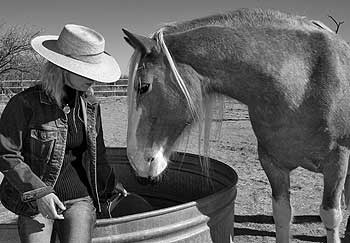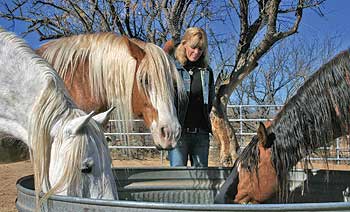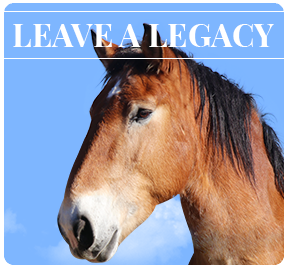By Jaime Richardson, Green Valley News
Published: Tuesday, February 26, 2008
Tubac resident Karen Pomroy says that saving horses is a mission close to her heart.
For the past four years, her 10-acre ranch has been the home of Equine Voices, a non-profit organization dedicated to saving the silent victims of the Premarin industry.
Premarin is a prescription hormone-replacement drug given to menopausal women, consisting primarily of estrogens found in the urine of pregnant mares. Most of the horses at Equine Voices were rescued from Canadian Premarin farms where they are kept in deplorable conditions, said Pomroy.
When the mares are too old to give birth, they are sent to slaughter, like their foals before them.
It’s a common misconception that only horses that are old and lame are sent to slaughter, Pomroy said. “All of these horses are beautiful, healthy companion animals.”
“It’s just a disgusting practice,” she said. “There are thousands of horses out there that need our protection.”
More than 100 volunteers help out at the ranch at least once a month, cleaning stalls, doing office work or just spending time with the horses, who are sometimes skittish around people after their years of abuse and neglect.
Jennifer Patton of Tucson, who has been volunteering at Equine Voices since May, says that when her mother first approached her about attending a volunteer orientation, she was wary of the idea.
“I wanted to keep my blinders on, I didn’t want to know about the abuse,” she said.
But as a cancer survivor, Patton felt an immediate connection to the horses – the fellow survivors.
“It’s life-changing to be part of this,” said Patton. “These horses were abused, but they learn to forgive. It’s amazing.”

JAIME RICHARDSON | green valley news
Karen Pomroy shares a moment with Callie, a 10-year-old pregnant draft horse rescued in October. Callie and her unborn foal are both available for adoption, said Pomroy.

JAIME RICHARDSON | green valley news
It’s mealtime for pregnant mares Mystic, Callie and Gracie, who were rescued last year from a Premarin farm in Manitoba, Canada. Karen Pomroy, owner and founder of Equine Voices, says they are due to give birth “any day now.”
Currently, 18 horses are available for adoption and can be viewed at www.equinevoices.com. Several others are permanent members of the family, including the organization’s mascot, Gulliver, a big brown draft horse who Pomroy describes as a “gentle giant.”
The public can meet Gulliver at the annual fundraiser event that will take place Saturday, March 8, at the Horse Haven Equestrian Center in Tucson. Tickets are $5. Activities will include live auctions and raffles, live music, carriage rides and a tack sale. All proceeds raised at the popular event, attended by more than 600 people last year, goes directly to Equine Voices.
A portion of the funds will help with their new Euthanasia Fund, which helps horse-owners pay to put down their animal humanely. This would also discourage owners from selling their horse at auction, where a high percentage of horses end up across the border for slaughter, said Pomroy.
While horse-slaughtering is now banned in the United States, it is still legal for foreign countries to import American horses for this purpose, a practice being fought in Congress with H.R. 503, the American Horse Slaughter Prevention Act.
“We need to support this bill and put an end to horse slaughter,” Pomroy said.
For more information about Equine Voices or the annual fundraiser, visit their Web site or call (520)-398-2814.






